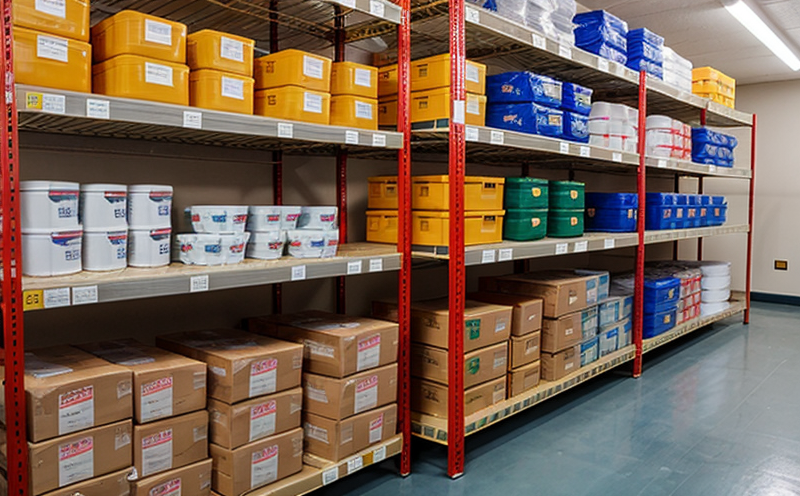Peptide Stability Testing
The stability of peptides is a critical factor in pharmaceutical development and quality control. Peptides are complex biomolecules that require rigorous testing to ensure their integrity, efficacy, and safety throughout the entire shelf life. This service involves a series of tests designed to assess how peptide formulations behave over time under various environmental conditions.
Peptides can degrade through several mechanisms such as hydrolysis, oxidative damage, and enzymatic cleavage. These degradations can lead to a loss in biological activity or even the formation of potentially harmful by-products. Therefore, understanding these stability parameters is essential for ensuring that peptides remain safe and effective over their shelf life.
Our peptide stability testing service follows international standards such as ICH Q5C, which provides guidance on chemical stability information to support drug registration. The process includes accelerated aging studies, long-term stability studies, and intermediate stability tests. Each of these tests is designed to simulate real-world conditions that a product might encounter during storage or use.
In an accelerated aging study, samples are exposed to extreme conditions such as high temperature and humidity for extended periods. This helps predict how the peptide will degrade under more severe environmental stressors than typical commercial storage conditions. The results from this test provide valuable insights into potential stability issues that may arise during transit or long-term storage.
The long-term stability study, on the other hand, aims to assess the shelf life of a peptide product by storing it under normal or slightly elevated temperature and humidity conditions over an extended period. This allows us to determine if there are any significant changes in potency or quality that could impact patient safety.
For some peptides, especially those with lower stability profiles, we also conduct intermediate stability tests. These tests provide additional data points between the results of an accelerated aging study and a long-term stability study. Intermediate studies help refine our understanding of the degradation processes involved and allow us to make more precise predictions about shelf life.
- ICH Q5C Compliance: Our testing aligns with ICH guidelines ensuring robust data for regulatory submissions.
- Accelerated Aging: Simulating real-world stressors to predict long-term stability issues.
- Long-Term Stability: Determining shelf life under normal storage conditions.
- Intermediate Stability Tests: Providing additional data points for more precise predictions.
Why Choose This Test
Selecting the right stability testing method is crucial for maintaining product integrity and ensuring regulatory compliance. Our peptide stability testing service offers several key advantages:
Comprehensive Coverage: We cover all major aspects of peptide stability including chemical, physical, and biological properties. This ensures a holistic evaluation that covers every angle necessary to fully understand the behavior of your product.
Regulatory Compliance: By adhering strictly to international standards like ICH Q5C, our tests ensure you have reliable data for regulatory submissions. This is particularly important in today’s highly regulated pharmaceutical industry where non-compliance can lead to significant delays or even failure of product approval.
In-depth Expertise: Our team comprises experienced scientists with deep knowledge of peptide chemistry and biology. Their expertise allows them to provide not just test results but also valuable insights into potential stability issues and how they might be mitigated.
Customized Solutions: Every product is unique, which is why we offer customized testing protocols tailored specifically to your peptide’s characteristics. Whether it's a novel therapeutic candidate or an established drug undergoing formulation changes, our approach ensures the most accurate assessment possible.
Quality and Reliability Assurance
Ensuring high-quality and reliable results is paramount in peptide stability testing. We employ state-of-the-art facilities equipped with advanced analytical instruments like HPLC, GC-MS, and IR spectroscopy to measure various parameters such as purity, impurity levels, and molecular weight distribution.
- Advanced Analytical Instruments: Utilizing HPLC, GC-MS, and IR spectroscopy for precise measurements.
- Purity Analysis: Ensuring that the peptide remains pure throughout its shelf life.
- Impurity Levels Monitoring: Detecting even trace amounts of impurities which could indicate degradation processes.
- Molecular Weight Distribution: Maintaining consistent molecular weight to ensure therapeutic efficacy.
Customer Impact and Satisfaction
The impact of peptide stability testing extends far beyond just meeting regulatory requirements. It directly influences customer satisfaction by ensuring the safety, quality, and effectiveness of pharmaceutical products. Here’s how our service contributes:
Patient Safety: By identifying potential degradation pathways early on, we help prevent issues that could affect patient health.
Product Quality: Consistent results across all batches ensure uniform product quality which is crucial for maintaining brand reputation and trust among healthcare providers.
Efficient Regulatory Pathways: Reliable stability data speeds up the regulatory approval process by reducing the number of required follow-up studies. This can significantly reduce development costs while also bringing life-saving treatments to market faster.





